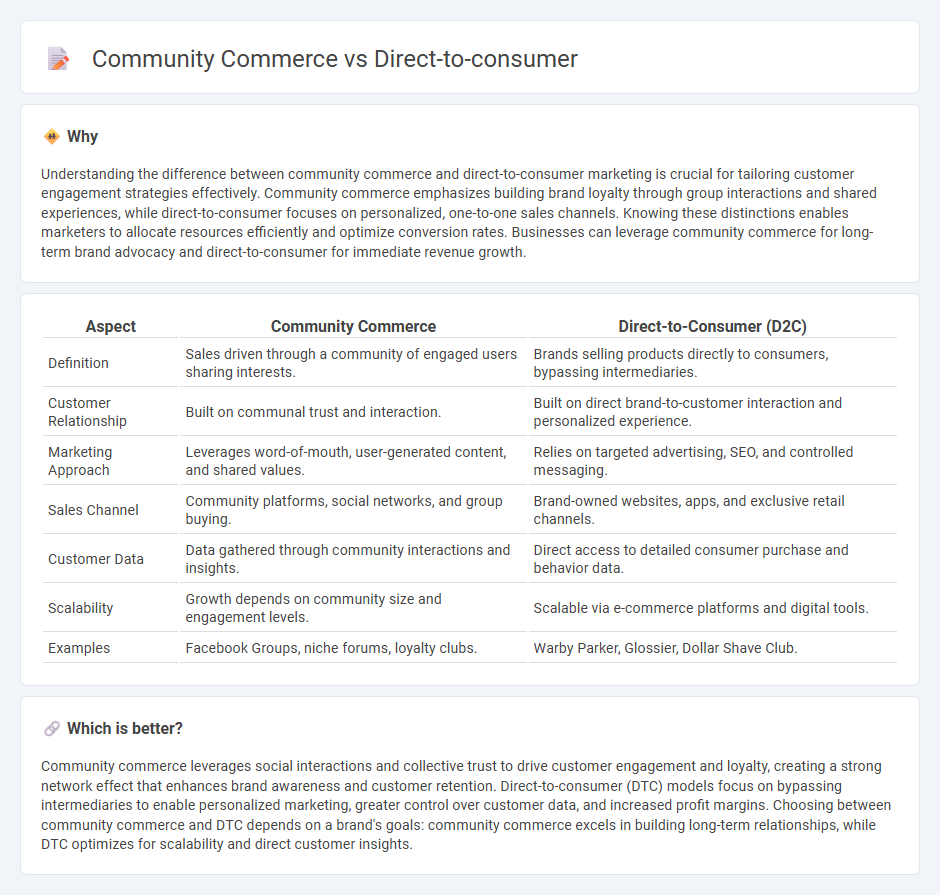
Community commerce leverages the power of social networks and group influence to drive product discovery and purchase decisions, fostering trust and engagement among members. Direct-to-consumer (DTC) strategies bypass traditional retail channels, allowing brands to maintain control over customer experience and collect first-party data for personalized marketing. Explore how these approaches redefine customer relationships and sales growth in modern marketing.
Why it is important
Understanding the difference between community commerce and direct-to-consumer marketing is crucial for tailoring customer engagement strategies effectively. Community commerce emphasizes building brand loyalty through group interactions and shared experiences, while direct-to-consumer focuses on personalized, one-to-one sales channels. Knowing these distinctions enables marketers to allocate resources efficiently and optimize conversion rates. Businesses can leverage community commerce for long-term brand advocacy and direct-to-consumer for immediate revenue growth.
Comparison Table
| Aspect | Community Commerce | Direct-to-Consumer (D2C) |
|---|---|---|
| Definition | Sales driven through a community of engaged users sharing interests. | Brands selling products directly to consumers, bypassing intermediaries. |
| Customer Relationship | Built on communal trust and interaction. | Built on direct brand-to-customer interaction and personalized experience. |
| Marketing Approach | Leverages word-of-mouth, user-generated content, and shared values. | Relies on targeted advertising, SEO, and controlled messaging. |
| Sales Channel | Community platforms, social networks, and group buying. | Brand-owned websites, apps, and exclusive retail channels. |
| Customer Data | Data gathered through community interactions and insights. | Direct access to detailed consumer purchase and behavior data. |
| Scalability | Growth depends on community size and engagement levels. | Scalable via e-commerce platforms and digital tools. |
| Examples | Facebook Groups, niche forums, loyalty clubs. | Warby Parker, Glossier, Dollar Shave Club. |
Which is better?
Community commerce leverages social interactions and collective trust to drive customer engagement and loyalty, creating a strong network effect that enhances brand awareness and customer retention. Direct-to-consumer (DTC) models focus on bypassing intermediaries to enable personalized marketing, greater control over customer data, and increased profit margins. Choosing between community commerce and DTC depends on a brand's goals: community commerce excels in building long-term relationships, while DTC optimizes for scalability and direct customer insights.
Connection
Community commerce leverages social connections to build trust and foster brand loyalty, creating a direct pathway between consumers and brands. Direct-to-consumer (DTC) models benefit from these engaged communities by enabling personalized marketing, real-time feedback, and stronger customer relationships. This synergy enhances customer lifetime value and reduces dependency on intermediaries or traditional retail channels.
Key Terms
Channel Ownership
Channel ownership in direct-to-consumer (DTC) models allows brands full control over customer data, marketing strategies, and purchasing experiences, leading to enhanced brand loyalty and personalized engagement. Community commerce emphasizes shared ownership and influence, fostering trust and active participation through social interactions and peer recommendations within niche groups. Explore the unique advantages of channel ownership in both DTC and community commerce to optimize your brand's market presence.
Customer Engagement
Direct-to-consumer (D2C) models prioritize personalized customer experiences and direct interactions, enabling brands to gather valuable data and quickly adapt marketing strategies. Community commerce leverages customer groups and shared interests, fostering engagement through social proof, peer recommendations, and interactive brand participation. Explore how these approaches redefine customer engagement to drive loyalty and sales growth.
Social Proof
Direct-to-consumer (DTC) brands leverage social proof by showcasing authentic customer reviews, testimonials, and user-generated content to build trust and credibility directly with their audience. Community commerce amplifies social proof through interactive community engagement, peer recommendations, and shared brand experiences within groups, creating stronger emotional connections and loyalty. Explore how integrating these social proof strategies can enhance your brand's growth and customer retention.
Source and External Links
Direct-to-consumer - A business model where brands sell products directly to customers, bypassing third-party retailers or wholesalers, often transacted online and exemplified by brands like Warby Parker and Glossier.
Direct to Consumer (D2C) Guide - "Direct to consumer" means brands sell straight to end users via their own digital channels, with D2C sales expected to exceed $200 billion by 2024, often complementing traditional retail rather than fully replacing it.
What Is Direct-to-Consumer? Everything You Need To Know - This retail model allows brands to control the entire customer experience and fulfillment, enabling direct communication, personalized marketing, and better customer insights without middlemen.
 dowidth.com
dowidth.com